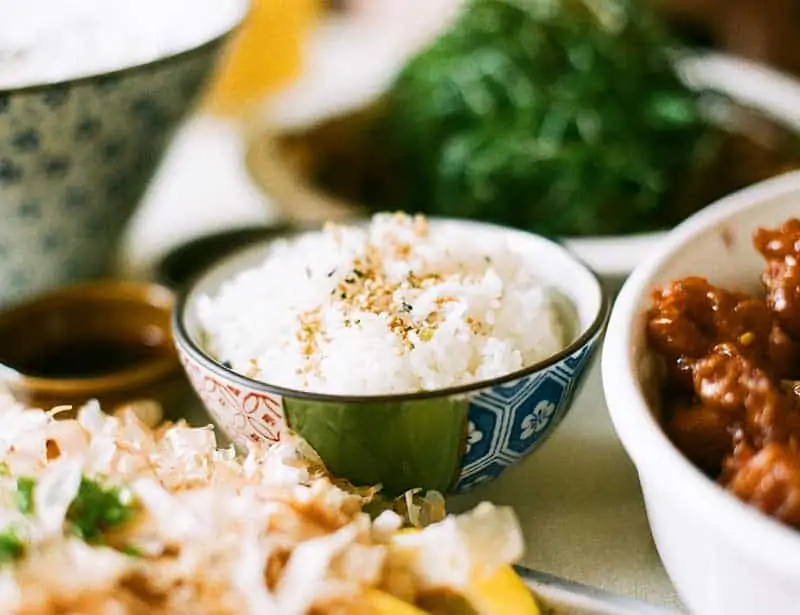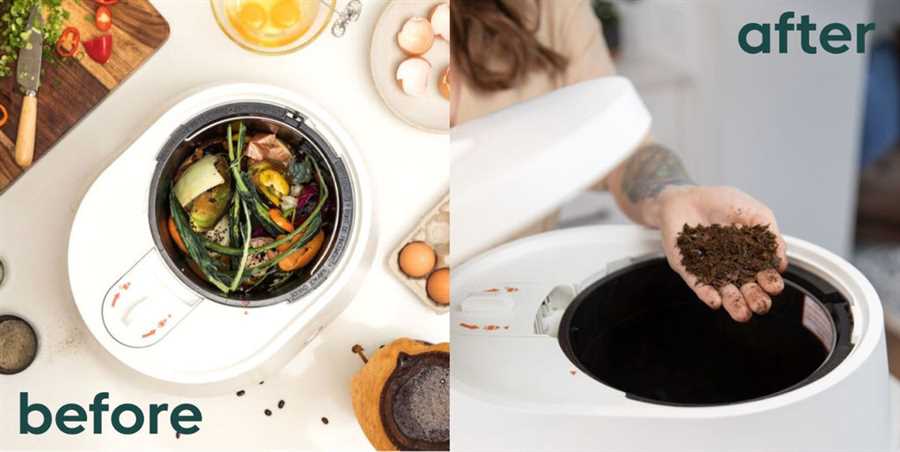


Rice is a staple food for many people around the world, and it’s no surprise that sometimes we end up with leftovers. But what should we do with all that extra cooked rice? Can it be composted?
The short answer is yes, cooked rice can be composted. Composting is the process of decomposing organic matter, and cooked rice fits the bill. However, there are a few things to keep in mind when composting cooked rice.
First and foremost, it’s important to let the rice cool completely before adding it to your compost bin. Cooked rice can quickly become a breeding ground for bacteria if left at room temperature, so make sure it’s cool to the touch before tossing it in.
Another thing to consider is the potential for attracting pests. Cooked rice is a food source for many animals, including rats and mice. To avoid unwanted visitors in your compost pile, bury the rice deep within the compost or cover it with a layer of carbon-rich materials like leaves or straw.
It’s also worth mentioning that cooked rice can be a bit clumpy and sticky, which can affect the airflow within your compost pile.
In conclusion, cooked rice can be composted as long as it’s cooled completely and buried deep within the compost pile. By following these guidelines, you can turn your leftover rice into nutrient-rich compost for your garden.
Is Cooked Rice Compostable?
Composting is a great way to reduce waste and enrich the soil in your garden. However, not all food waste can be composted. One common question that often comes up is whether cooked rice can be composted.
The short answer is yes, cooked rice can be composted. Rice is a natural material that can break down over time and provide valuable nutrients to your compost pile. However, there are a few things to keep in mind when composting cooked rice.
1. Avoid adding large quantities of cooked rice
While cooked rice can be composted, it is best to add it in small quantities. This is because rice can clump together and create anaerobic conditions in your compost pile, leading to a slow decomposition process. To prevent this, mix the cooked rice with other compostable materials such as leaves, yard trimmings, or coffee grounds.
2. Store the cooked rice properly
If you plan to compost cooked rice, make sure to store it properly before adding it to your compost pile. Cooked rice should be refrigerated promptly after cooking to prevent bacterial growth. Avoid leaving it at room temperature for extended periods, as this can make it more prone to clumping and attracting pests.
In conclusion, cooked rice can be composted, but it is important to add it in small quantities and store it properly. By following these guidelines, you can successfully incorporate cooked rice into your compost pile and contribute to a healthier, more sustainable garden.
The Composting Process
Composting is a natural process that converts organic materials, such as food scraps and yard waste, into soil-like material called compost. This process is fueled by microorganisms, such as bacteria, fungi, and worms, which break down the organic matter.
Benefits of Composting

Composting offers numerous benefits for both the environment and gardeners. It helps reduce the amount of waste sent to landfills, reducing methane emissions and preserving valuable landfill space. Additionally, compost improves soil health by adding nutrients, increasing moisture retention, and promoting beneficial microbial activity.
The Composting Process
Composting involves a balance of organic materials, moisture, oxygen, and temperature. The process can be divided into two stages: the active stage and the curing stage.
1. Active Stage:
In this stage, microorganisms actively break down the organic matter. The compost pile should have a balance of carbon-rich materials, known as browns (such as leaves and woody materials), and nitrogen-rich materials, known as greens (such as kitchen scraps and grass clippings). Proper aeration and moisture levels are essential to promote decomposition.
2. Curing Stage:
After the active stage, the compost enters the curing stage, where it continues to decompose gradually. During this stage, the compost matures and stabilizes to become a nutrient-rich material that resembles soil. Curing can take several months to a year, depending on various factors, such as temperature and the composition of the pile.
Note: It’s important to avoid adding meat, dairy products, and oily foods to your compost pile, as they can attract pests and slow down the decomposition process. Additionally, cooked rice is safe to compost as long as it is not mixed with excessive oils or sauces.
By properly managing the composting process and maintaining the optimal conditions, you can produce high-quality compost to enrich your garden soil and reduce waste.
What Can Be Composted?
Composting is an excellent way to reduce waste and create nutrient-rich soil for gardening. Not all materials can be composted, so it’s important to know what can and cannot be added to your compost pile.
Here is a list of common items that can be composted:
- Fruit and vegetable scraps
- Eggshells
- Coffee grounds and filters
- Tea bags
- Grass clippings
- Leaves
- Prunings and trimmings from plants
- Branches and twigs
- Shredded paper and cardboard
- Wood chips
- Hay and straw
- Houseplants
- Cotton and wool scraps
- Feathers
- Aquarium plants
- Seaweed
However, there are some items that should not be added to your compost pile. These include:
- Meat and dairy products
- Fats and oils
- Bones
- Processed foods
- Coal or charcoal ash
- Plastic and synthetic materials
- Yard trimmings treated with pesticides
- Pet waste
It’s important to maintain a balance of “green” (nitrogen-rich) and “brown” (carbon-rich) materials in your compost pile. Green materials provide nitrogen, while brown materials provide carbon. This balance ensures that the composting process is efficient and that the resulting compost is of high quality.
By composting your organic waste, you can help reduce the amount of waste sent to landfills and create a valuable resource for your garden.
Benefits of Composting
Composting is the process of decomposing organic waste materials, such as food scraps and yard waste, into a nutrient-rich soil amendment. It is an environmentally friendly practice that offers several benefits.
|
1. Nutrient-rich soil: Composting produces a dark, crumbly substance known as compost. This compost is rich in nutrients like nitrogen, phosphorus, and potassium, which are essential for plant growth. Adding compost to your soil improves its fertility, structure, and overall health. |
2. Reduced need for chemical fertilizers: By using compost, you can reduce or eliminate the need for chemical fertilizers in your garden. Compost provides a slow release of nutrients to plants, promoting healthy growth without the risk of over-fertilization. |
|
3. Soil moisture retention: Compost has the ability to retain moisture in the soil, preventing water runoff and promoting water conservation. It helps plants withstand drought conditions and reduces the need for frequent watering. |
4. Improved soil structure: Compost improves the structure of the soil by adding organic matter. It helps sandy soils retain moisture and nutrients, while also improving drainage in clay soils. This creates an ideal growing environment for plants. |
|
5. Erosion control: When applied to bare soil, compost acts as a protective layer, helping to prevent soil erosion caused by wind and water runoff. It helps to stabilize slopes, reduce sedimentation in water bodies, and maintain the integrity of the land. |
6. Reduction of waste sent to landfills: Composting diverts organic waste materials from ending up in landfills. This helps to reduce greenhouse gas emissions and the production of methane gas, a potent contributor to climate change. |
Overall, composting is a sustainable practice that benefits both the environment and your garden. It enriches the soil, reduces the need for chemicals, conserves water, prevents erosion, and reduces waste. Start composting today and enjoy the many advantages it brings!
Rice and Composting

Composting is a great way to reduce waste and create nutrient-rich soil for your garden. Many food scraps can be composted, but what about cooked rice?
The answer is yes, cooked rice can be composted. Rice is a biodegradable material that breaks down easily in a compost pile or bin. However, there are a few things to keep in mind when composting cooked rice.
1. Avoid using large quantities of cooked rice
If you have a large amount of leftover cooked rice, it’s best to find other ways to use it before composting. Adding too much rice to your compost pile can create a dense mass that may not decompose properly. You can freeze cooked rice for future use or consider donating it to local food banks or charities.
2. Mix rice with other compostable materials
Rice alone may not provide enough carbon for proper decomposition. To ensure that your compost pile has the right balance of carbon and nitrogen, mix cooked rice with other compostable materials such as fruit and vegetable scraps, yard waste, or coffee grounds. Aim for a ratio of roughly 3 parts carbon to 1 part nitrogen in your compost pile.
Note: Brown rice and wild rice may take longer to decompose compared to white rice due to their higher fiber content. It’s best to chop them into smaller pieces or soak them before adding them to the compost pile.
In conclusion, cooked rice can be composted, but it’s important to use it in moderation and mix it with other compostable materials. By composting your rice, you can reduce waste, save money on fertilizers, and create nutrient-rich soil for your garden.
Q&A
Can I compost cooked rice?
Yes, you can compost cooked rice. Rice is an organic material that can break down and decompose in a compost pile. However, it is important to avoid adding too much cooked rice at once, as it can create a compacted, anaerobic environment in the compost. It is recommended to mix the cooked rice with other compostable materials to maintain a good balance.
Is it okay to compost leftover rice?
Yes, it is perfectly fine to compost leftover rice. Leftover rice is a food waste that can be added to a compost pile. Just make sure to mix it with other compostable materials to prevent any issues with the composting process. Avoid adding large amounts of leftover rice at once, as it can create a dense environment in the compost pile.
Why is it recommended to compost cooked rice?
Composting cooked rice is recommended because it allows you to repurpose and recycle food waste. By composting cooked rice, you can reduce the amount of organic material that goes to landfill and instead create nutrient-rich compost for your garden or plants. It is a sustainable and eco-friendly way to dispose of leftover rice.
What should I do with leftover rice if I can’t compost it?
If you can’t compost leftover rice, there are a few other options you can consider. You can freeze it and use it as a base for future meals, such as fried rice or rice pudding. Alternatively, you can donate the leftover rice to a food bank or soup kitchen, where it can be distributed to those in need. If there are no other options available, it can be disposed of in the regular trash.
Can I compost rice if it has other ingredients mixed in?
If the rice has other ingredients mixed in, such as sauces or seasonings, you can still compost it. However, it’s important to consider the other ingredients and their compostability. Some ingredients, like oils or meat products, may not be suitable for composting and could attract pests. In such cases, it is recommended to remove any non-compostable items before adding the rice to the compost pile.






